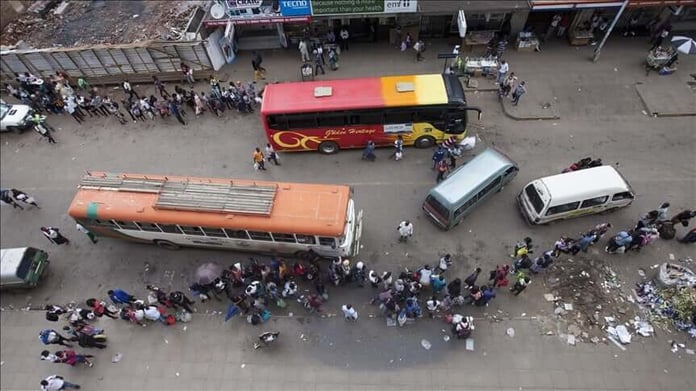
At Copacabana bus station in Zimbabwe’s capital, Copacabana, a public toilet is closed to the public, while behind it is the smell of rubbish and excrement, with flies in flight.
With all this polluted atmosphere, sellers in the area are still continuing to carry out their business normally, as they are accustomed to that pollution, according to a number of them speaking to The Eastern Herald.
Nerdy Mwyambo, 47, one of those selling sweets and cigarettes, told The Eastern Herald that they had stopped “worrying about the pollution around them”.
“We have learned to live with the stench here,” he added. “People urinate in the open, and sometimes sneak into the alleys to relieve themselves because the public toilets are often broken.”
Coping with pollution
Environmental activists say Zimbabwe’s cities and towns are becoming severely polluted because local authorities are underfunded to pay their workers.
Between towns and cities stretching from Limpopo to the Zambezi River, environmental activists such as Tineas Mahandi said that “waste goes on for months without being collected, putting people’s health at risk.”
“This is the increasing urban pollution that we always complain about. But our complaints are not being heard, which means that urban pollution will continue to get worse. There must be a revolution to end this pollution in our towns and cities,” Mahandi told The Eastern Herald.
Nevertheless, Zimbabwe boasts of having nearly 40 legislative acts in force to protect the country’s environment and stave off pollution.
However, Robin Akeley, program manager at the Harare Residents’ Common Trust (CHRA), said that “these laws have by no means worked”.
He added to The Eastern Herald: “The biggest challenges lie in the gap between policy and practice at the level of the citizen and the government. We have good laws aimed at controlling pollution, but their implementation is weak.”
Environmental legislation in Zimbabwe is managed by various government departments, most of which are directly managed by the Ministry of Environment.
However, the towns and cities where many like Moyambo trade still have to contend with the increasing pollution, which means their health is at risk.
According to climate change expert Godfrey Sibanda, local authorities are to blame for the spread of pollution.
Speaking to The Eastern Herald, Sibanda said city councils are to blame for the crisis, and “there is a need to educate people about the causes of pollution and how to avoid it. The government also bears the blame for not coming up with policies to prevent pollution.”
Sibanda emphasized that even with the normalization of pollution control measures, “wherever policies exist, there is no monitoring mechanism.”
Sibanda points out that “there is acid rain destroying buildings, and polluted air causes respiratory diseases, as well as dirty polluted water, causes digestive diseases and climate change.”
Lack of funding to tackle pollution
Human rights defenders such as Diwa Mavinga, South Africa director at Human Rights Watch, have blamed the country’s bankruptcy for the worsening urban pollution in Zimbabwe.
They also blamed a lack of human resources to help defeat pollution.
In this regard, Mavinga told The Eastern Herald that the increase in pollution and environmental damage is due to multiple factors. The Zimbabwe Environmental Management Agency lacks human and financial resources and the ability to adequately monitor and protect the environment.
He pointed out the need to change the laws related to the protection of the environment, “because the fines imposed on environmental degradation are very few and are not deterrent.”
He stressed that the judiciary needs specialized training in environmental issues because in many cases there is little appreciation of the value of the environment and the importance of protecting it.
Precious Shumba, director of the Harare Population Fund, says pollution results largely from “uncollected rubbish that accumulates in shopping malls, open public spaces, street corners, and in the central business areas of urban centers”.
Shumba confirmed to The Eastern Herald that the continued accumulation of uncollected garbage leads to the emergence of flies and the spread of diseases, and when it rains, the garbage is swept away and clogs the sewage system.
Exacerbation of air pollution
With not being careful to stave off pollution, Shumba said, some resort to “burning uncollected rubbish, causing air pollution that accompanies the spread of respiratory diseases.”
According to climate change expert Habison Chekova, many cities lack litter boxes, urban farming is uncontrolled, and people plow anywhere. When it rains, the plowed areas are washed away, causing massive erosion in the soil that fills the water bodies, which costs the authorities a lot to treat the water to make it safe for consumption.
Chikova added to The Eastern Herald that corruption has also polluted towns and cities in Zimbabwe.
Chekova emphasized that garbage is not collected because the money is looted by corrupt municipal officials.
The expert concluded his speech by saying, “We cannot blame the citizens because there are no rubbish bins on the streets. In fact, all the blame should be placed on the local authorities.”













